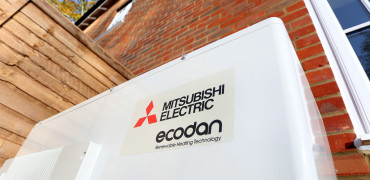In what might possibly be one of her last significant acts as Prime Minister – apart from resigning with the Brexit shambles no closer to being resolved, obviously – Theresa May has introduced a statutory instrument before Parliament that will amend the Climate Change Act and introduce a legally-binding net zero emission target for 2050.
There was widespread support for the move, putting the UK on a direct course to a more sustainable future.
Indeed, as Julie Hirigoyen, Chief Executive at UKGBC, said: “This is a powerful and positive move by the Prime Minister that will give her time in office a legacy beyond Brexit. Setting this important and necessary target now sends a strong signal to business that Britain is ready to lead the world in tackling the climate crisis.”
Renewable heating systems like heat pumps have been recognised as an important part of the solution.
An empty legacy?
But is this really a powerful legacy? Or is it akin to David Cameron’s bold and ultimately pointless and empty statement when first taking office that his Government would be the “greenest” administration the UK had ever seen?
Julie Hirigoyen went on to add that: “We must accelerate action in all areas including improving the efficiency of our aging building stock, and overcoming the challenge of decarbonising heat. To do this, we need to see both policy and industry leadership to ensure the built environment is at the vanguard of emissions reductions.
“There is no time to lose, now is the time to act.”
And that could well be the legacy of Theresa May’s announcement. We have plenty of pressing needs that need urgent attention – but our political system seems incapable of reacting with any sort of haste. In fact, massive oil tankers are probably sniggering that the UK Government has been warned that: “There is no time to lose, now is the time to act.”
It is time for radical change and the question remains are we prepared to make such a move?
Decarbonising heat
The government must introduce radical heat decarbonisation policies if it is to deliver on its intention to legislate for net zero emissions by 2050, says Switch2 Energy.
"Although the UK has made impressive strides in reducing emissions from power, progress on heat decarbonisation has been poor because it's a much more difficult challenge", says Richard Slee, CEO of Switch2.
Heat accounts for more than a third of UK greenhouse gas emissions. If the government is to stand any chance of hitting the ambitious net zero target, it will need to heed the wise words of Elvis and engage in 'less conversation' and take 'more action' on heat policy.
"The UK is already falling behind on its existing 2025 and 2030 emissions reduction targets, so doing more of the same is no longer enough", added Richard Slee. "Immediate, revolutionary action is required and that must include replacing CO2 emitting boilers with lower carbon alternatives and using high efficiency heat networks, wherever feasible. It is crucial that this summer's energy white paper provides a clear route map to rapid heat decarbonisation and that the government walks the talk on energy sustainability.
"The government has already committed £320 million investment in heat networks, but these are complex and expensive infrastructure projects. Even more support will be required if we are to generate an anticipated 14-20% of UK heat demand from heat networks over the next decade, as opposed to the current 2% level.
"In addition to developing new 4th and 5th generation heat networks, there are cost effective and simple opportunities to improve the emissions performance of existing schemes. This scheme optimisation can be implemented speedily and would involve ensuring proper insulation and using smart control and heat metering systems to drive energy efficiency. In addition, it's relatively easy to upgrade plant to transition to cleaner new technologies, such as large-scale heat pumps."
The future of heating
Manufacturers are certainly playing their part. Mitsubishi Electric has been at the forefront of industry research and development in recent years, bringing a range of products to market that provide greater opportunity to reduce the costs of heating systems.
As the UK strives to meet its carbon reduction targets, renewable heating systems like Ecodan air source heat pumps have been recognised as an important part of the solution. This is why the Government is encouraging the installation of heat pumps as the low carbon alternative to gas, oil and LGP heating.
Ecodan air source heat pumps are the modern alternative to gas boilers, which were popularised in the 1960s, they can be used both on and off the gas grid, only requiring an electrical connection. Ecodan is the modern renewable alternative to a gas boiler and produces renewable heating and hot water with much lower carbon emissions.
A gas boiler will produce less than 1kW of heat energy for every kW of gas consumed. A heat pump on the other hand harvests renewable energy from the outdoor air so will produce 3 or more kW of heat energy for every kW of electricity consumed.
Paul Groves is editor of Specification magazine



